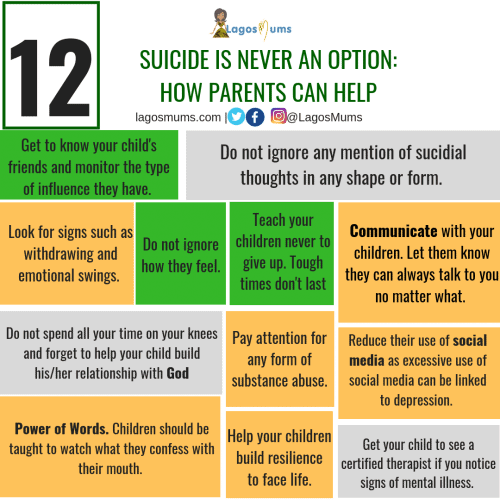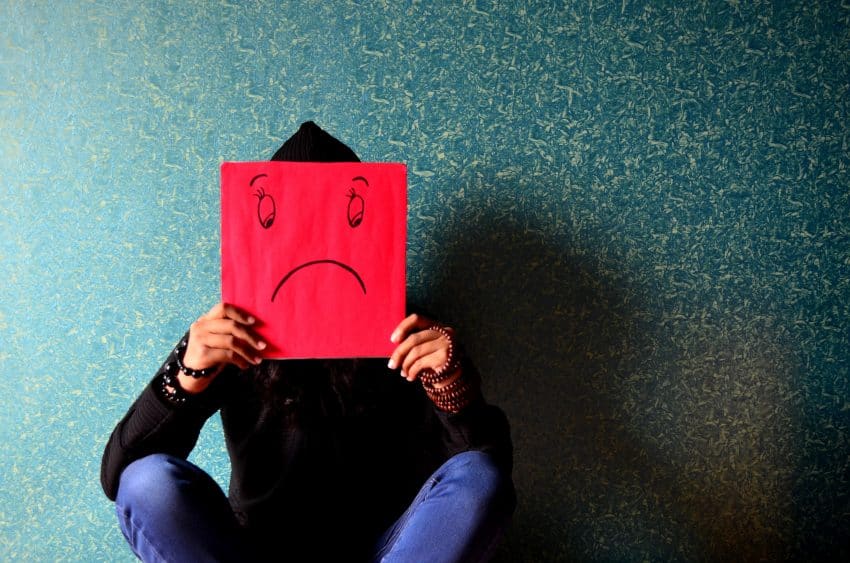Unfortunately, stories of people who have committed suicide have made it to the news here in Nigeria and across the world. No matter what a person goes through, suicide is never an option. Knowledge of the signs of suicide is very important for parents and caregivers to know what to look out for. This can just save someone from a drastic step.
There has been a range of reasons in recent cases of suicide. These have ranged from documented cases of mental health challenges, depression, feeling of hopelessness and in other cases no obvious signs.
Many of the recently reported cases have been young people and children in their teens. One of the cases was reported as a young lady who committed suicide because she did not pass her JAMB results and decided to take her life as a result of the disappointment. In another case, the child had allegedly hinted and talked about committing suicide in the past. But no one really ever thought it would happen. It is one of the worst news that anyone can get.
Today is World Suicide Prevention Day; but in reality, everyone should stay alert. It is more important than ever for everyone to know the signs so they can help anyone who is dealing with any mental illness or suicidal thoughts.
 Suicide is never an option.
Suicide is never an option.
According to Dr Excel Adeleye, a counsellor and coach “suicide is an effect of something psychological or a mental dysfunction in a person. This is what makes a person conclude that he/she has no ability to be hopeful for a desired future”. Below he shares some reasons why children might start to have thoughts of suicide. This knowledge will arm parents with the signs of suicide and other mental health challenges.
Some Factors That Might Encourage Thoughts of Suicide
1. Parent(s) depressive state:
There is a transmission of depression emotionally or psychologically to a child when a parent who is yet to receive treatment for a mental or physical sickness tries to nurture a child. The parent will unconsciously infuse his/her distressing state in treating or attending to the child. For example, a depressed parent might handle the wrong behaviour of a child through excessively hard or harsh punishment.
2. Social Media influences
We need to accept the reality of social media and the internet has become a more accessible medium to connect. With regards to children, social media is a potent instrument that is influencing them. The heavy use of this leads to baggage, which is many times more than the child can handle. They meet and connect with different people and can easily develop involvement in negative vices, not known to their parents.
There are several sources on the internet that encourage the thought of suicide and sadly, some children even deliberately record a live video of the suicide act. Our concern should now be about how the thought grows and what the signs of suicide ideation is among children.
3. Behavioural/attitude disorder
The insistence on good manners and discipline is absent from many of the parenting styles exhibited today. As a result, some children become agitated when required to obey their parents or follow instructions. For such children, they may become angry and rebel. For a child who is already nursing unhealthy thoughts, the pressure of discipline to the psyche of the child with a behavioural disorder; might result in the consideration of extreme moves such as suicide.
4. Self Esteem crisis
The crisis of low self-esteem is one of the most common agitations that happens to the psyche of a young child. These have sometimes been at the root of some suicide ideation. The pressure of societal norms which prizes materialism could manifest in the desire for designer clothes and the latest gadgets or phones at all costs. This could lead to a child who feels he must have things to feel important or relevant among friends.
Unfortunately, parents could be the source that encourages and creates an environment that adds to the low self-esteem of their children. The internal struggle of a parent who hasn’t dealt with his or her inner struggles from childhood can transfer to a child. If a child is struggling with self-esteem issues and combined with a negative or unhealthy mental state, there might be signs that are red flags.
5. Sexual abuse or emotional abuse
Many pieces of research and statistics over the years have proven that an emotionally abused child is more likely to grow up as an unhealthy mental adult which disrupts their well-being as adults. It is therefore critical for a child who has been sexually molested or emotionally battered to seek a professional’s help to prevent the thought of suicide and avoid depression.
Suicide is preventable and one of the ways to save someone who is at risk is to recognise the signs that someone is slipping into depression or having suicidal thoughts. This is not the time to focus solely on casting out demons, but realising when a young person needs help and know-how to get them the help they need.
when someone is slipping into depression or having suicidal thoughts is not the time to focus solely on casting out demons. Click To Tweet
How Parents Can Stay Aware of Signs of Depression
1. Never Dismiss What They Talk About
People who take their lives don’t want to die, but rather want to end their pain. They generally feel at the end of their rope and do not see a way out, so they want to take what they think will cure their hopelessness. Never dismiss the talk of suicide as just threats. They might talk openly about wanting to die or are fixated on the topic of death and dying. There’s also extreme, frequent or occasional usage of some words or phrases while communicating.
2. Child becomes withdrawn
Changes in their pattern of behaviour could be a warning sign. Suddenly avoiding friends and family, losing interest in activities and social events, and becoming isolated are indications of depressive behaviours.
3. Shows despair
The person may talk openly about unbearable pain or feeling like they’re a burden on others. This includes their social media accounts, they might feel safe to share their thoughts here. If you notice this; please raise the alarm and tell a trusted person.
4. Shows swings in mood or sleep.
Often, the person may be depressed, anxious, sad, or angry. They also may be very irritable, moody, or aggressive. There may be aggressive misbehaviours towards peers or older people around him/her. Because they can suddenly turn calm once they’ve decided to go through with the suicide; so you have to pay attention to signs and sudden mood swings.
5. Drinks or takes drugs.
Substance abuse raises the chance of suicide. They may Indulge in alcohol or hard drugs secretly or openly. Using drugs and alcohol may be an attempt to dull the pain or to harm themselves. This is usually accompanied by excessive adventure for sexual acts or pornography addiction.
6. Behavioural changes
Demonstration of esteem problems such as shyness, inferiority complex, or mental behavioural disorders such as bipolar calls for alarm. There may also be several complaints of tiredness and stress on activities.
7. Other signs you should watch out for include:
Disturbing Content such as audio, video or games that the child regularly feeds on. You should also note the lifestyle and behaviour of the people he/she takes as friends and confidants. Also worthy to note is a child who shares dark thoughts in their writings; including on their social media feed or searches on death. The violent killing of animals by a child without empathy is also a red flag.

What To Do With The Signs
If you notice any signs, you must speak out and ask them questions, if you cannot do this mention it to someone who might be able to get them the help they need. Do not belittle how they feel, rather let them express themselves and then seek the help that they might need. Do not leave such a person alone and encourage them that suicide is never an option.
You may need to employ the service of a certified counsellor, therapist or psychiatrist to diagnose these signs.
Do not belittle how they feel, rather let them express themselves and then seek the help that they might need Click To Tweet
How Parents and Caregivers Can Help
1. Keep an open line of communication with your child. This is the most important things that you can do. Every child needs to know that they have someone with whom they can confide in at all times. Listen to their concerns and help them navigate and find solutions to their challenges. Suicide signs many times includes a deep sense of hopelessness.
2. Let them know God for themselves. Do not spend all your time on your knees praying for them; that you forget to help them develop their own spiritual muscle. Life will always have some challenges and children need to be equipped. They should have a thankful heart, be able to pray and have faith when things are tough.
3. Power of Words. Children should also be taught to watch what they confess with their mouths. Labels such as “I am so stressed” or “I am depressed” can take on a life of their own and manifest themselves. As a parent, if you notice that your child gets in the habit of saying they are stressed, help them to manage pressure in practical ways,
4. Limit Online Access. It is vital that you limit the amount of time that children and teenagers spend online. The more time they spend online, the more likely they can become addicted or suffer from overexposure and the stress that comes from that.
5. Signs of Depression/Suicide in Children. In children, depression is often a reaction to something external. However, in the case of endogenous depression; it is due to the presence of an internal cognitive or biological stressor. In this case, it is not due to a social or environmental stressor and no trigger for depression is detectable. To recognise depression in children, empathy is needed.
As a parent, or caregiver if you notice any signs you are concerned about; then quickly get in touch with a professional to assess your child or ward. Please do not ignore any signs.
Does Social Media Go Hand in Hand with Teen Depression?
According to Dr. Jeff Nalin, a Licensed Clinical Psychologist, social media and teen depression go hand in hand. If you have a teenager who uses social media on a daily basis, it’s important you learn how social media can cause depression and other problems such as encouraging signs and thoughts of suicide. Read Tips on How to Manage Screen Time.
It’s not uncommon for teens to have their smartphones on hand at all times. As a result, they are always connected to external influences and almost never have the time to think for themselves. P
Peer influence is already something children need to deal with, with the onslaught of screen time it is even more challenging. Teens won’t always seek help when things go wrong online, making them feel even more helpless. The signs of suicide and the thoughts around this can be sadly encouraged online. Therefore it is important to be vigilant and notice the mood and tone of your child.
Facebook is reportedly using Artificial Intelligence to help predict when users might be suicidal. Every day, millions of social media posts, chats, and queries on Facebook, Snapchat, Google, Siri and Alexa relate to mental health. AI algorithms are being used to track and help prevent suicide.
Read: Parenting Winning in a Digital World
Always remind the young people in your life that suicide is never an option! There is always hope and someone to talk to.


